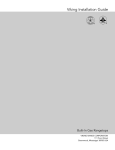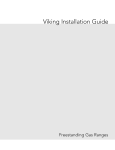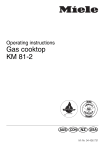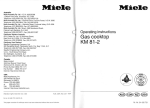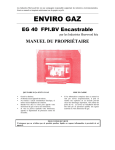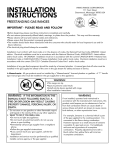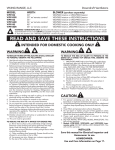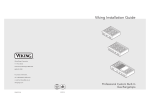Download Viking VGRT48 Specifications
Transcript
INSTALLATION INSTRUCTIONS VIKING RANGE CORPORATION 111 Front Street Greenwood, Mississippi 38930 USA (662) 455-1200 BUILT-IN GAS RANGETOPS IMPORTANT - PLEASE READ AND FOLLOW •Before beginning, please read these instructions completely and carefully. •Do not remove permanently affixed labels, warnings, or plates from the product. This may void the warranty. •Please obseve all local and national codes and ordinances. •Please ensure that this product is properly grounded. •The installer should leave these instructions with the consumer who should retain for local inspector’s use and for future reference. Installation must conform with national and local codes or in the absence of codes, the National Fuel Gas Code, ANSI Z223.-latest edition. Electrical installation must be in accordance with National Electrical Code, ANSI/NFPA 70 and/or local codes. IN CANADA: Installation must be in accordance with the current CAN/CGA B149.1 & 2 Gas Installation codes and/or local codes. Electrical installation must be in accordance with the current CSA C22.1 Canadian Electrical Codes Part 1 and/or local codes. Installation of any gas-fired equipment should be made by a licensed plumber. A manual gas shut-off valve must be installed in the gas supply line ahead of the oven in the gas stream for safety and ease of service. In Massachusetts: All gas products must be installed by a “Massachusetts” licensed plumber or gasfitter. A “T” handle type manual gas valve must be installed in the gas supply line to the appliance. WARNING: IF THE INFORMATION IN THIS WARNING MANUAL IS NOT FOLLOWED EXACTLY, A FIRE OR EXPLOSION MAY RESULT CAUSING PROPERTY DAMAGE, PERSONAL INJURY, OR DEATH. If not installed, operated and maintained in accordance with the manufacturer’s instructions, this product could expose you to substances in fuel or from fuel combustion which can cause death or serious illness and which are known to cause cancer, birth defects, or other reproductive harm. 1. Do not store or use gasoline or other flammable vapors and liquids in the vicinity of this or any other appliance. 2. WHAT TO DO IF YOU SMELL GAS: •Do not try to light any appliance. •Do not touch any electrical switch; do not use any phone in your building. •Immediately call your gas supplier from a neighbor’s phone. •Follow the gas supplier’s instructions. •If you cannot reach your gas supplier, call the fire department. 3. Installation and service must be performed by a qualified installer, service agency, or the gas supplier. For example, benzene is a chemical which is part of the gas supplied to the cooking product. It is consumed in the flame during combustion. However exposure to a small amount of benzene is possible if a gas leak occurs. Formaldehyde and soot are by-products of incomplete combustion. Properly adjusted burners with a bluish rather than yellow flame will minimize incomplete combustion. WARNING!! ELECTRICAL GROUNDING INSTRUCTIONS This rangetop must be electrically grounded in accordance with local codes. This appliance is equipped with a threeprong plug for your protection against shock hazard and should be plugged directly into a properly grounded reeptacle. Do not cut or remove the grounding prong from this plug. FOR PERSONAL SAFETY, THIS APPLIANCE MUST BE PROPERLY GROUNDED Basic Specifications VGRT Models Description Overall width Overall height Overall depth from rear Cutout width Cutout Height Cutout Depth Electrical requirements Gas requirements Maximum amp usage Surface burner rating Wok Burner rating (If applicable) Griddle burner 30” W. Models Shipping Wt. 48” W. Models 60” W. Models Shipped natural gas standard; field convert to LP/Propane with standard convertible regulator; accepts standard residential 1/2” (1.3 cm) ID gas service line .3 amps 6B - .6 amps 6G - 4.2 amps 6G - 7.8 amps 4G - 3.9 amps 6Q .6 amps 6GQ-4.2 amps 4Q - .6 amps 4G - 7.2 amps 4GQ- 4.2 amps 4K .6 amps 4Q - .6 amps 15.000 BTU Nat./13,500 BTU LP/Propane (4.4 kW Nat./4.0 kW LP/Propane) N/A N/A 27,500 BTU Nat./LP N/A (8.2 kW Nat./LP N/A N/A rating Approximate 42” W. Models 30” (76.2 cm) 36” (91.4 cm) 42 1/8” (107 cm) 48” (121.9 cm) 59 5/8” (151.4 cm) Open top Burners - 7 1/2” (19.1 cm) (top of grate support should be 3/8” [1.0 cm] above countertop. Sealed Burners- 7 5/8” (19.4 cm) (top of side trim should be 3/8” [1.0 cm] above countertop. Minimum 24” (61.0 cm) Maximum 25 3/4” (65.4 cm) 120 VAC/60 Hz 4ft. (121.9 cm), 3-wire cord with grounded 3-prong plug rating Grill burner 36” W. Models 29 7/8” (759. cm) 35 7/8” (91.1 cm) 42” (106.7 cm) 47 7/8” (121.6 cm) 59 1/2” (151.1cm) (Open top Burners only) To top of spider grate 9 1/4” (23.5 cm) (Sealed Burners only) To top of burner grate 9 1/8” (23.2 cm) To top of island trim 8 7/8” (22.5 cm) To top of 6” backguard13 7/8” (35.2 cm) To top of high shelf 31 3/8” (79.7 cm) To end of side panel 24” (61.0 cm) To end of control panel 25 3/4” (65.4 cm) To end of knobs 27 3/4” (70.5 cm) 125 lbs. (56.3 kg) 12”/18” Wide 24” Wide 15,000 BTU Nat./13,500 BTU LP Two 15,000 BTU Nat./13,500 BTU LP (4.4 kW / 4.0 kW ) (4.4 kW / 4.0 kW) 12” Wide - 1 @ 18,000 BTU Nat. (5.3 kW)/ 16,000 BTU LP/Propane (4.7 kW) 24” Wide - 2 @ 15,000 BTU Nat. (4.4 KW) / 13,500 BTU LP/Propane (4.0 kW) 6B-150 lb.(67.5kg) 4G - 160 lb.(72.0kg) 4Q - 155 lb.(69.8 kg) 6G -203 lb.(91.4kg) 6G - 256lb.(115.2kg) 6Q -198 lb.(89.1kg) 6GQ-251 lb.(113.0kg) 4G - 213 lb.(95.6kg) 4GQ-208 lb.(93.6 kg) 4K - 213 lb.(95.6 kg) 4Q - 198 lb.(89.1 kg) Minimum clearances from adjacent combustible construction •Cooking surface and below (36” [91.4 cm ] and below) •Sides - 0” •Rear - 0” with backguard or high shelf; 0” with island trim and non-combustible rear wall; 6” (15.2 cm) with island trim and combustible rear wall. •Top grate support - 36” (91.4 cm) •Above cooking surface (above 36” [91.4 cm]) •Sides - 6” (15.2 cm) •Within 6” (15.2 cm) side clearance, wall cabinets no deeper than 13” (33.0 cm) must be minimum 18” (45.7 cm) above cooking surface. •Wall cabinets directly above product must be minimum 36” (91.4 cm) for open top burners and 42” (106.7 cm) for sealed burners above cooking surface. *It is not recommended to install two or more units side by side. 2 Basic Specifications DGRT Models Description Overall width Overall height Overall depth from rear Cutout width Cutout Height Cutout Depth Electrical requirements Gas requirements 30” W. Models To To To To top top top top of of of of 36” W. Models 29 7/8” (759. cm) 35 7/8” (91.1 cm) grate 6 1/8” (15.6 cm) island trim 6 1/8” (15.6 cm) 6” backguard12 1/8” (30.8 cm) high shelf 24 1/8” (61.3 cm) To end of side panel 24 1/2” (62.2 cm) To end of control panel 26 1/8” (66.4 cm) To end of knobs 27 5/8” (70.5 cm) 30” (76.2 cm) 36” (91.4 cm) 5 3/4” (14.6 cm) (top of grates should be 3/8” [1.0 cm] above countertop. 24 1/2” (62.2 cm) 120 VAC/60 Hz 4ft. (121.9 cm), 3-wire cord with grounded 3-prong plug Shipped natural gas standard; field convert to LP/Propane with standard convertible regulator; accepts standard residential 1/2” (1.3 cm) ID gas service line 2.0 amps 2.0 amps Maximum amp usage Surface burner rating left front 16,000 BTU Nat./15,500 BTU LP/Propane (4.7 kW Nat./4.5 kW LP/Propane) left rear 12,000 BTU Nat./11,500 BTU LP/Propane (3.5 kW Nat./3.4 kW LP/Propane) center N/A right rear right front Approximate 8,000 BTU Nat./7,500 BTU LP/Propane (2.0 kW Nat./1.9 kW LP/Propane) 6,000 BTU Nat./5,500 BTU LP/Propane (1.5 kW Nat./1.4 kW LP/Propane) 125 lbs. (56.3 kg) 12,000 BTU Nat./11,500 BTU LP/Propane (3.5 kW Nat./3.4 kW LP/Propane) 10,000 BTU Nat./9,500 BTU LP/Propane (2.5 kW Nat./2.4 LP/Propane) 16,000 BTU Nat/15,500 BTU LP/Propane (4.7 kW Nat./4.5 kW LP/Propane) 8,000 BTU Nat./7,500 BTU LP/Propane (2.0 kW Nat./1.9 kW LP/Propane) 6,000 BTU Nat./5,500 kW LP/Propane (1.5 kW Nat./1.4 kW LP/Propane) 150 lb.(67.5kg) Shipping Wt. Minimum clearances from adjacent combustible construction •Cooking surface and below (36” [91.4 cm ] and below) •Sides - 0” •Rear - 0” with backguard or high shelf; 0” with island trim and non-combustible rear wall; 6” (15.2 cm) with island trim and combustible rear wall. •Top grate support - 36” (91.4 cm) •Above cooking surface (above 36” [91.4 cm]) •Sides - 6” (15.2 cm) •Within 6” (15.2 cm) side clearance, wall cabinets no deeper than 13” (33.0 cm) must be minimum 18” (45.7 cm) above cooking surface. •Wall cabinets directly above product must be a minimum 42” (106.7 cm) for sealed top burners *It is not recommended to install two or more units side by side. 3 GENERAL INFORMATION 1. WARNING:: The use of cabinets for storage above the appliance may result in a potential burn hazard. Combustible items may ignite, metallic items may become hot and cause burns. If a cabinet storage is to be provided the risk can be reduced by installing a rangehood that projects horizontally a minimum of 5” (12.7 cm) beyond the bottom of the cabinets. 2. All openings in the wall behind the appliance and in the floor under the appliance shall be sealed. 3. Keep appliance area clear and free from combustible materials, gasoline, and other flammable vapors. 4. Do not obstruct the flow of combustion and ventilation air. 5. Disconnect the electrical supply to the appliance before servicing. 6. When removing oven for cleaning and/or service; A. Shut off gas at main supply B. Disconnect AC power supply C. Disconnect gas line to the inlet pipe. D. Carefully remove the rangetop by pulling out of cabinet cutout. E. When cleaning and/or service is complete, replace unit in cabinet cutout, reconnect gas line and power supply, and turn on gas at main supply. 7. Electrical Requirement Listed on Specification sheet. Electrical installation should comply with national and local codes. 8. Gas Manifold Pressure: Natural gas 5.0” W.C.P. LP/Propane 10.0” W.C.P. WARNING Never use this appliance as a space heater to heat or warm the room. Doing so may result in carbon monoxide poisioning and over heating of the unit. GAS INLET/ELECTRICAL LOCATION A B 3/4” Min. (1.9 cm) VGRT Models 30”, 36”, 42”,48” W. VGRT Models 60” W. DGRT Models 30”, 36” W. A B Min. 24” (61.0 cm) 3” (7.6 cm) Max. 25 3/4 (65.4 cm) Min. 24” (61.0 cm) 14 3/8” (36.5 cm) Max. 25 3/4 (65.4 cm) Min. 24 1/2” (62.2 cm) 3” (7.6 cm) Max. 26 1/8” (66.4 cm) 4 C 2 1/4” (5.7 cm) 9/16” (1.8 cm) 2 1/4” (5.7 cm) Proximity to Side Cabinet Installation 1. This rangetop may be installed directly adjacent to existing 36” (91.4 cm) high base cabinets. IMPORTANT: The top grate support MUST be 3/8” (.95 cm) above the adjacent base cabinet countertop. 2. The rangetop CANNOT be installed directly adjacent to sidewalls, tall cabinets, tall appliances, or other side vertical surfaces above 36” (91.4 cm) high. There must be a minimum of 6” (15.2 cm) side clearance from the rangetop to such combustible surfaces above the 36” (91.4 cm) counter height. 3. Within the 6” (15.2 cm) side clearance to combustible vertical surfaces above 36” (91.4 cm) , the maximum wall cabinet depth must be 13” (33.0 cm) and wall cabinets within this 6” (15.2 cm) side clearance must be 18” (45.7 cm) above the 36” (91.4 cm) high countertop. 4. Wall cabinets above the rangetop must be a minimum of 36” (91.4 cm) for the open top burner models and a minimum of 42” (106.7 cm) for the sealed burner models above the rangetop cooking surface for the full width of the rangetop. This minimum height requirement does not apply if a rangehood is installed over the cooking surface. Dim. 30” W. Models A 30” (76.2 cm) Dim. VGRT Open Burners VGRT Sealed Burners DGRT Sealed Burners 36” W. Models 36” (91.4 cm) 42” W. Models 42 1/8” (107.0 cm) B 36” (91.4 cm) min. 42” (106.7 cm) min. 42” (106.7 cm) min. 48” W. Models 48” (121.9 cm) 60” W. Models 59 5/8” (151.4 cm) C 7 1/2” (19.1 cm) 7 5/8” (19.4 cm) 5 3/4” (14.6 cm) B A C 5 WOOD/COMPOSITE OVERLAY INSTALLATION The bottom of any hood should be 30” (68.6 cm) min. to 36” (91.4) max. above the countertop. This would typically result in the bottom of the hood being 66” (167.6 cm) to 72” (182.9 cm) above the floor. Refer to the rangehood installation instructions for additional information. These dimensions provide for safe and efficient operation of the hood. WALL INSTALLATION ISLAND INSTALLATION Wood/Composite Overlay Wood/Composite Overlay Metal Hood Metal Hood 30” (76.2 cm) Min. 36” (91.4 cm) Max 30” (76.2 cm) Min. 36” (91.4 cm) Max 66” (167.6 cm) Min. to 72” (182.9 cm) Max. 66” (167.6 cm) Min. to 72” (182.9 cm) Max. Countertop 36” (91.4 cm) 36” (91.4 cm) 6 Countertop Gas Connection All gas connections must be made according to national and local codes. This gas supply (service) line must be the same size or greater than the inlet line of the appliance. This rangetop uses an ISO7 or ISO128 inlet. The inlet depends on the end users national and local codes. 1. Manual Shut-off Valve: This installer-supplied valve must be installed in the gas service line ahead of the appliance in the gas stream and in a position where it can be reached quickly in the event of an emergency. In Massachusetts: A “T” type handle manual gas valve must be installed in the gas supply line to the appliance. 2. Pressure Regulator a) All heavy duty cooking equipment must have a pressure regulator on the incoming service line for safe and efficient operation, since service pressure may fluctuate with local demand. External regulators are not required on this rangetop, because a regulator is built into each unit at the factory. Under no condition bypass this built-in regulator. b) Any conversion required must be performed by your dealer or a qualified licensed plumber or gas service company. Please provide the service person with this manual before work is started on the range. (Gas conversions are the responsibility of the dealer or end user.) c) This rangetop can be used with Natural or LP/Propane gas. It is shipped from the factory adjusted for use with natural gas. To convert to LP/Propane, see conversion instructions on page 11. d) Manifold pressure should be checked with a manometer, natural gas requires 5.0” W.C.P. and LP/Propane requires 10.0” W.C.P. Incoming line pressure upstream from the regulator must be 1” W.C.P. higher than the manifold pressure in order to check the regulator. The regulator used on this range can withstand a maximum input pressure of 1/2 PSI (14.0” W.C.P.) If the line pressure is in excess of that amount, a stepdown regulator will be required. e) The appliance, its individual shut-off valve, and pressure regulator must be disconnected from the gas supply piping system during any pressure testing of that system at pressures in excess of 1/2 psig (3.45 kPa). f) The appliance must be isolated from the gas supply piping system by closing its individual manual shut-off valve during any pressure testing of the gas supply piping system at test pressures equal to or less than 1/2 psig (3.45 kPa). 3. Flexible Connections: a) If the unit is to be installed with flexible couplings and/or quick disconnect fittings, the installer must use a heavy-duty, agency approved flexible connector of at least 1/2” (1.3 cm) ID NPT (with suitable strain reliefs) in compliance with ANSI Z21.41 and Z21.69 standards. b) In Canada: CAN 1-6.10-88 metal connectors for gas appliances and CAN 1-6.9 M79 quick disconnect device for use with gas fuel. c) In Massachusetts: The appliance must be installed with a 36” (3-foot) long flexible gas connector. CAUTION: Leak testing of the appliance shall be conducted according to the manufacturer’s instructions. Before placing the rangetop into operation, always check for leaks with a soapy water solution of other acceptable method. DO NOT USE AN OPEN FLAME TO CHECK FOR LEAKS! Electrical Connection There is no connection necessary beyond plugging the unit into a polarized, grounded, 120 volt, 60 Hz, 15 amp circuit. The minimum of 102 VAC is required for proper operation of gas ignition systems. Do not use GFI circuit. This circuit, however, MUST be grounded and properly polarized. The unit is equipped with a 16-SPT2 power cord. WARNING!! Electrical Grounding Instructions This appliance is equipped with a three prong grounding plug for your protection against shock hazard and should be plugged directly into a properly grounded receptacle. Do not cut or remove the grounding prong from the plug. 7 Surface Burner Adjustments (For Open Surface Burners) (See Illustration #2) To gain access to the surface burner adjustments: 1. Remove the grates, burner caps, bowls and grate supports. 2. Located the air shutter (A) and loosen the screw (B) that holds the air shutter in place. 3. Remove the drip tray, allowing you work space to adjust the orifice hood (C). 4. Replace grate support and burner bowls (this allows for correct air flow, as in normal use). 5. Light each burner by rotating the burner valve shaft (D) to high position. 6. With a proper flame height, adjust the air shutter (A) to obtain a blue flame with no yellow tipping that sits on the burner at the burner ports. a) Open the air shutter gap to eliminate yellow tipping. b) Close the air shutter gap to prevent a noisy flame that lifts off the burner. 7. Turn the surface burners off. 8. Replace the drip tray. 9. Remove grate support and burner bowls. 10. Tighten the air shutter screw (B) being careful to not change the adjusted shutter gap. 11. Replace the grate supports, burner bowls, burner caps, and grates. 12. Turn the lighted burners to the low flame setting. 13. Insert a narrow, flat-blade screwdriver into the hollow shaft of the surface burner valve, and engage the slotted low flame adjustment screw. The low flame should be a small flame that comes just to the top edge of the burner. Rotate the adjusting screw (E) clockwise to lower the flame or counter clockwise to increase the flame. Turn the burner off and relight several times, turning to the low position. The low flame should light at every port each time. Readjust as needed. Surface Burner Adjustments (For Sealed Surface Burners) (See Illustration #2) 1. Turn the lighted burners to the low flame setting. 2. Insert a narrow, flat-blade screwdriver into the hollow shaft of the surface burner valve, and engage the slotted low flame adjustment screw. The low flame should be a small flame that comes just to the top edge of the burner. Rotate the adjusting screw (E) clockwise to lower the flame or counter clockwise to increase the flame. Turn the burner off and relight several times, turning to the low position. The low flame should light at every port each time. Readjust as needed. Illustration #2 8 Wok Burner Adjustment To gain access to the burner for adjustments: A 1. Remove the grate and grate support. 2. Locate the air shutter “A” and loosen the two screws “B” that holds the air shutter in place. 3. Light the burner and turn the burner knob to the high position. 4. With a proper, high flame height, adjust the air shutter to obtain a blue flame with no yellow tipping that sits on the burner at the burner ports. (a) open the air shutter gap to add more air and to eliminate yellow tipping. (b) close the air shutter gap to reduce the air and to prevent a noisy flame that lifts off the burner. 5. Turn the surface burners off. 6. Tighten the air shutter screws. 7. Replace the grate support and grate. B AIR SHUTTER 3/4” (1.91 cm) Air Shutter Orifice FLAME HEIGHT OVERHEAD VIEW 9 Grill/Griddle Burner Adjustment Grill 1. The grill burner orifice and air shutter are located beneath the front end of the grill assembly. To gain access to the adjustment, remove the grill grate, grate support, flame spreaders, and the burner shield. 2. Remove the screw at the front and rear of the burner. 3. Lift the burner off the orifice and locate the air shutter adjustment screw at the end of the burner. (See Detail “A”) 4. Loosen the screw and adjust the air shutter to the desired setting [for natural gas open shutter approximately 3/8” (.95 cm); for LP gas open the air shutter approximately 7/16” (1.1 cm)]. 5. Tighten the screw, then replace the burner on the orifice. 6. Check the flame for desired height before replacement of the above parts. 7. The flame adjustments are the same as the surface burners. Use a 1/2” (1.3 cm) deep socket to adjust the orifice head; turn clockwise to decrease flame and counter clockwise to increase flame. Griddle 1. To gain access to the burner orifice and air shutter, remove grates and grate supports located on either side of the griddle. Lift and remove the griddle. CAUTION: Before fully removing the griddle assembly, lift the griddle assembly approximately 4” above the griddle box. Carefully remove the temperature probe from the probe bracket. (See Detail “B”) Make note of the position of the temperature probe so it can be reinstalled properly. Failure to properly reinstall can result in damage to the temperature probe. 2. Carefully remove the ignitor and put to the side. 3. Remove the metal plate located below the burner. 4. Remove the screws at the front and rear of the burner, remove the burner tube and locate the air shutter adjustment screw at the end of the burner tube. 5. Flame adjustments are the same as the grill #4-#7. 6. Replace all griddle parts and griddle. Detail A Probe Bracket Detail B 10 Natural to LP/Propane Conversion Instructions (For Open Surface Burners) This product is manufactured and adjusted for operation with natural gas as shipped from the factory. To operate with LP/Propane gas, the following adjustments must be made. CAUTION: Before proceeding with conversion, turn off gas supply to the appliance and disconnect the electrical power. 1. A pressure regulator is located in the left rear corner of the burner box. To gain access to the pressure regulator, remove the two grates, two burner bowls, and the left grate support. Convert the regulator by removing the cap marked “NAT” and reverse it to read “LP”. Be sure not to disturb or remove the spring beneath the cap. 2. To convert surface, griddle, grill, and tubular bake burner to LP/Propane, turn the burner orifice hoods clockwise until they become snug against the internal LP/Propane pin orifice. 3. See the “Gas Burner Adjustment” section to obtain a properly adjusted flame for all burners. Natural to LP/Propane Conversion Instructions (For Sealed Surface Burners) This product is manufactured and adjusted for operation with natural gas as shipped from the factory. CAUTION: Before proceeding with conversion, turn off gas supply to the appliance and disconnect the electrical power. To operate with LP/Propane gas, the following adjustments should be made: 1. Remove the surface grates. 2. Remove the burner cap (Item#1) and the burner head (Item#2) by lifting up. 3. Remove the venturi (Item#3). 4. Use a 11/32” (0.9 cm) socket or nut driver to remove orifice (Item#4) and replace it with LP/Propane orifices located next to the pressure regulator. (See Figure 2) Save the natural gas orifice for future use. 5. Replace the venturi (Item#3) and hand tighten. Replace the burner head (Item#2), the burner cap (Item#1) and the surface grates. 6. To convert surface, griddle,and grill burners to LP/Propane, turn the burner orifice hoods clockwise until they become snug against the internal LP/Propane pin orifice. 7. A pressure regulator is located in the left rear corner of the burner box. To gain access to the pressure regulator, remove the backguard. Convert the regulator by removing the cap marked “Nat” and reverse it to read “LP”. Be sure not to disturb or remove the spring beneath the cap. 8. Manifold pressure should be checked with a manometer. LP/Propane requires 10.0” W.C.P. Incoming line pressure upstream from the regulator Pressure must be 1” W.C.P. higher than the manifold pressure. Regulator LP Orifices 11 Item #1 Item #2 Item #3 Item #4 Figure 1 Manifold Figure 2 Initial Ignition of Burners (For Open Surface Burners) All rangetops are tested before leaving the factory. Field adjustments may be necessary for proper mixture of gas and air for proper operation. When the rangetop is connected to gas and electric service, it should be adjusted by a qualified technician. When adjustments are required, contact your dealer/installer for corrections. If assistance is not available, contact Viking Range Corporation Preferred Service for the nearest authorized service agent at (662) 451-4133. All corrections to installation are the responsibility of the dealer/installer or end user. Initial Ignition of Burners (For Sealed Surface Burners) All sealed top rangetops are tested before leaving the factory. There are no adjustments for the sealed surface burners if connected according to the information on the rating plate. Check each burner for proper operations. Flames should be blue in all settings. If service is required, contact your dealer for the name of their authorized service agency. If none is available, contact Viking Preferred Service for the nearest authorized service agency in your area. Gas conversions and initial installation are not the responsibility of the manufacturer. Performance Checklist The installer should carry out the following performance checks. Refer to instructions below. 1. 2. 3. 4. 5. 6. 6. Check surface burner ignition. Check air shutter adjustment - sharp blue flame, no yellow tipping, sooting or flame lifting Check low flame adjustment - surface burner valve center stem adjustment. Check griddle ignition - all burner ports. Check grill ignition - all burner ports. Visually check tubular burner reignition to be sure both sides are relighting each time. Check for gas leaks (odors) at all gas connections. (See page 7 for procedure on checking for gas leaks) Final Preparation 1. Some stainless steel parts may have a plastic protective wrap which must be removed. 2. All stainless steel body parts should be wiped with hot, soapy water and with a liquid cleaner designed for this material. If buildup occurs, do not use steel wool, abrasive cloths, cleaners, or powders! If it is necessary to scrape stainless steel to remove encrusted materials, soak with hot, wet cloths to loosen the material, then use a wood or nylon scraper. Do not use a metal knife, spatula, or any other metal tool to scrape stainless steel! Scratches are almost impossible to remove. NOTE: These installation instructions should remain with the unit for future reference. The electrical diagram is located beneath the drip tray in the rear corner of the burner box. Replacement Parts Only authorized replacement parts may be used in performing service on the oven. Replacement parts are available from factory authorized parts distributors. Contact Viking Range Corporation Preferred Service, (888) 845-4641, for the nearest parts distributor in your area. 12 WIRING DIAGRAM BUILT-IN GAS PROFESSIONAL RANGETOPS VGRT MODELS WARNING - Electrical grounding instructions This appliance is equipped with a three-prong grounding plug for your protection against shock hazard and should be plugged directly into a properly grounded socket. CAUTION - Label all wires prior to disconnection when servicing controls. Wiring errors can cause improper and dangerous operation. Verify proper operation after servicing. REFER ONLY TO FEATURES WHICH ARE EQUIPPED WITH THIS UNIT. 13 WIRING DIAGRAM BUILT-IN GAS DESIGNER SERIES RANGETOPS DGRT MODELS WARNING - Electrical grounding instructions This appliance is equipped with a three-prong grounding plug for your protection against shock hazard and should be plugged directly into a properly grounded socket. CAUTION - Label all wires prior to disconnection when servicing controls. Wiring errors can cause improper and dangerous operation. Verify proper operation after servicing. REFER ONLY TO FEATURES WHICH ARE EQUIPPED WITH THIS UNIT. 14 15 VIKING RANGE CORPORATION 111 Front Street • Greenwood, Mississippi 38930 USA • (662) 455-1200 Specifications subject to change without notice vikingrange.com F1239K (PS1105VR)
















